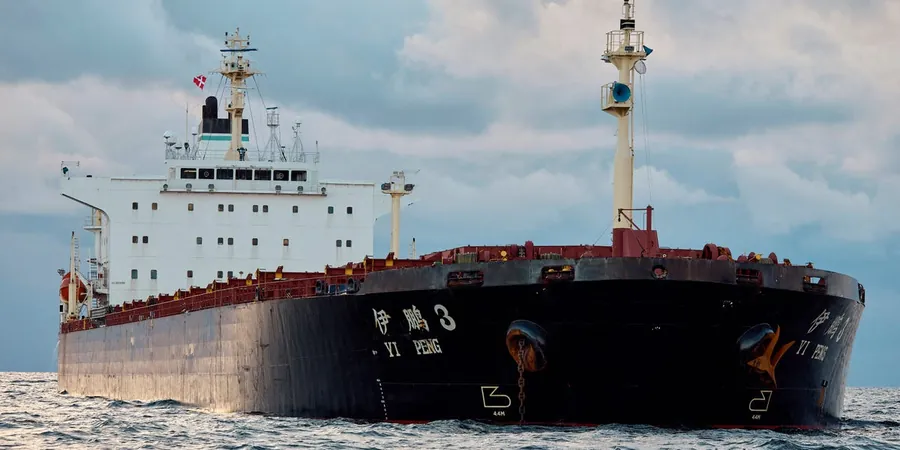
Chinese Cargo Ship Suspected of Sabotaging Undersea Cables Between NATO Nations — What You Need to Know!
2024-11-28
Author: Wei
In a troubling development...
Timeline of Events:
On November 15, the Yi Peng 3 departed from Russia's Ust-Luga port, laden with Russian fertilizer. This port, the largest on the Baltic Sea, has become increasingly pivotal following the accession of Sweden and Finland into NATO, leading many to refer to the Baltic Sea as a 'NATO lake.'
Two days later, the situation escalated. Investigators reported that Yi Peng 3 dropped anchor around 9 p.m. local time, but notably, the ship continued sailing while its anchor was down. It is believed that this led to the severing of a critical telecommunications cable connecting Sweden and Lithuania. Astonishingly, the vessel then traveled another 111 miles with the dragging anchor, cutting another cable linking Finland and Germany before raising anchor and continuing its journey.
Such behavior is highly irregular, as vessels typically recover their anchors promptly to avoid fuel wastage and navigational hazards. The dragging of an anchor over such a distance without intervention raises serious questions about the vessel's crew awareness.
Currently, Yi Peng 3 is anchored in the Kattegat Strait, under observation by Danish naval patrol vessels, while European authorities delve deeper into the investigation looking for potential sabotage connections.
Sabotage Concerns:
Compounding fears of foul play, Yi Peng 3's movements became untraceable when the ship's transponder was reportedly turned off or disabled, making it hard to track its location accurately. Open-source satellite imagery, however, placed the ship near the cut cables during the critical times of disturbance.
Investigators are skeptical that the ship's captain would remain oblivious to the dragging anchor. Kpler, a global trade analytics firm, argued that it was unlikely the dragging was accidental, given the approachable weather conditions during that period.
Germany's Defense Minister Boris Pistorius echoed the sentiments of many, asserting that the incident likely involved sabotage rather than being an unfortunate accident. 'We must understand that this is a hybrid action; we should assume that this involves sabotage, even if we do not yet know the perpetrator,' he stated.
Russia’s Involvement?
The departure of Yi Peng 3 from a Russian port has led to speculation about potential Russian intelligence involvement, especially against the backdrop of heightened tensions following the Ukraine war. While Western officials suspect orchestrated Russian influence, Kremlin spokesman Dmitry Peskov dismissed these claims as 'absurd,' arguing it was laughable to continue attributing blame to Russia without evidence.
In a joint statement, the foreign ministers of Finland and Germany expressed deep concern, pointing to the incident as a sign of increasing volatility in European security. They highlighted that safeguarding critical infrastructure has never been more urgent amidst threats not just from Russia's actions but also from 'malicious actors' engaged in hybrid warfare.
This shocking incident comes on the heels of warnings from U.S. officials about Russian threats to undersea cables and critical maritime infrastructures. An official noted a concerning uptick in Russian naval activity globally, hinting at a shift in strategy that may prioritize damaging U.S. and allied underwater infrastructures.
As investigations proceed, the implications of this incident extend beyond merely severed cables; it highlights a landscape where geopolitical tensions are spilling over into infrastructure sabotage, challenging the physical and digital resilience of nations. In light of these developments, NATO must remain vigilant and consider strengthening maritime security protocols to protect against future threats.

 Brasil (PT)
Brasil (PT)
 Canada (EN)
Canada (EN)
 Chile (ES)
Chile (ES)
 España (ES)
España (ES)
 France (FR)
France (FR)
 Hong Kong (EN)
Hong Kong (EN)
 Italia (IT)
Italia (IT)
 日本 (JA)
日本 (JA)
 Magyarország (HU)
Magyarország (HU)
 Norge (NO)
Norge (NO)
 Polska (PL)
Polska (PL)
 Schweiz (DE)
Schweiz (DE)
 Singapore (EN)
Singapore (EN)
 Sverige (SV)
Sverige (SV)
 Suomi (FI)
Suomi (FI)
 Türkiye (TR)
Türkiye (TR)